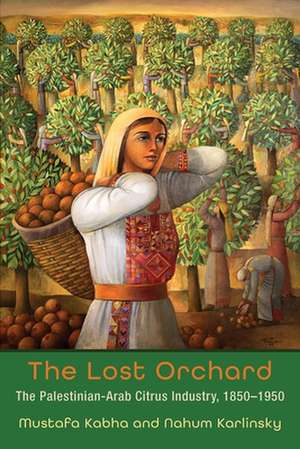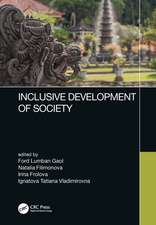Lost Orchard: Contemporary Issues in the Middle East
Autor Mustafa Kabha, Nahum Karlinskyen Limba Engleză Hardback – 31 mar 2021
This significant and unprecedented partnership was virtually erased from the collective memory of both Israelis and Palestinians when the Nakba decimated villages and populations in a matter of months. In The Lost Orchard, Kabha and Karlinsky tell the story of the Palestinian citrus industry from its inception until 1950, tracing the shifting relationship between Palestinian Arabs and Zionist Jews. Using rich archival and primary sources, as well as on a variety of theoretical approaches, Kabha and Karlinsky portray the industry's social fabric and stratification, detail its economic history, and analyze the conditions that enabled the formation of the unique binational organization that managed the country's industry from late 1940 until April 1948.
Din seria Contemporary Issues in the Middle East
-
 Preț: 226.37 lei
Preț: 226.37 lei -
 Preț: 187.10 lei
Preț: 187.10 lei -
 Preț: 297.37 lei
Preț: 297.37 lei -
 Preț: 229.14 lei
Preț: 229.14 lei -
 Preț: 338.08 lei
Preț: 338.08 lei -
 Preț: 136.94 lei
Preț: 136.94 lei -
 Preț: 209.76 lei
Preț: 209.76 lei -
 Preț: 160.08 lei
Preț: 160.08 lei -
 Preț: 274.71 lei
Preț: 274.71 lei -
 Preț: 160.64 lei
Preț: 160.64 lei -
 Preț: 102.30 lei
Preț: 102.30 lei -
 Preț: 136.13 lei
Preț: 136.13 lei -
 Preț: 201.63 lei
Preț: 201.63 lei -
 Preț: 241.09 lei
Preț: 241.09 lei -
 Preț: 223.67 lei
Preț: 223.67 lei -
 Preț: 447.97 lei
Preț: 447.97 lei -
 Preț: 342.69 lei
Preț: 342.69 lei -
 Preț: 231.51 lei
Preț: 231.51 lei -
 Preț: 266.06 lei
Preț: 266.06 lei -
 Preț: 222.03 lei
Preț: 222.03 lei -
 Preț: 264.05 lei
Preț: 264.05 lei -
 Preț: 101.63 lei
Preț: 101.63 lei -
 Preț: 102.80 lei
Preț: 102.80 lei -
 Preț: 268.95 lei
Preț: 268.95 lei -
 Preț: 262.25 lei
Preț: 262.25 lei -
 Preț: 107.16 lei
Preț: 107.16 lei -
 Preț: 138.75 lei
Preț: 138.75 lei -
 Preț: 229.10 lei
Preț: 229.10 lei -
 Preț: 222.75 lei
Preț: 222.75 lei -
 Preț: 222.96 lei
Preț: 222.96 lei -
 Preț: 206.57 lei
Preț: 206.57 lei -
 Preț: 381.93 lei
Preț: 381.93 lei -
 Preț: 73.95 lei
Preț: 73.95 lei -
 Preț: 148.50 lei
Preț: 148.50 lei -
 Preț: 440.85 lei
Preț: 440.85 lei - 23%
 Preț: 424.08 lei
Preț: 424.08 lei - 5%
 Preț: 163.25 lei
Preț: 163.25 lei -
 Preț: 346.80 lei
Preț: 346.80 lei -
 Preț: 300.10 lei
Preț: 300.10 lei -
 Preț: 307.88 lei
Preț: 307.88 lei -
 Preț: 510.93 lei
Preț: 510.93 lei -
 Preț: 331.58 lei
Preț: 331.58 lei -
 Preț: 457.45 lei
Preț: 457.45 lei -
 Preț: 211.11 lei
Preț: 211.11 lei -
 Preț: 238.74 lei
Preț: 238.74 lei -
 Preț: 144.48 lei
Preț: 144.48 lei
Preț: 421.85 lei
Preț vechi: 547.86 lei
-23% Nou
Puncte Express: 633
Preț estimativ în valută:
80.76€ • 88.03$ • 67.91£
80.76€ • 88.03$ • 67.91£
Carte tipărită la comandă
Livrare economică 17-31 decembrie
Preluare comenzi: 021 569.72.76
Specificații
ISBN-13: 9780815636700
ISBN-10: 0815636709
Pagini: 220
Dimensiuni: 157 x 235 x 17 mm
Greutate: 0.46 kg
Editura: Syracuse University
Seria Contemporary Issues in the Middle East
ISBN-10: 0815636709
Pagini: 220
Dimensiuni: 157 x 235 x 17 mm
Greutate: 0.46 kg
Editura: Syracuse University
Seria Contemporary Issues in the Middle East
Notă biografică
Mustafa Kabha is associate professor and chair of the Department of History, Philosophy, and Judaic Studies at Open University of Israel.
Nahum Karlinsky is a senior lecturer at the Ben-Gurion Research Institute, Ben-Gurion University of the Negev, Israel. He teaches modern Jewish history and Israeli studies.
Nahum Karlinsky is a senior lecturer at the Ben-Gurion Research Institute, Ben-Gurion University of the Negev, Israel. He teaches modern Jewish history and Israeli studies.
Descriere
Tells the story of the Palestinian citrus industry from its inception until 1950, tracing the shifting relationship between Palestinian Arabs and Zionist Jews. Kabha and Karlinsky portray the industry's social fabric, detail its economic history, and analyse the conditions that enabled the formation of a unique binational organisation.





















